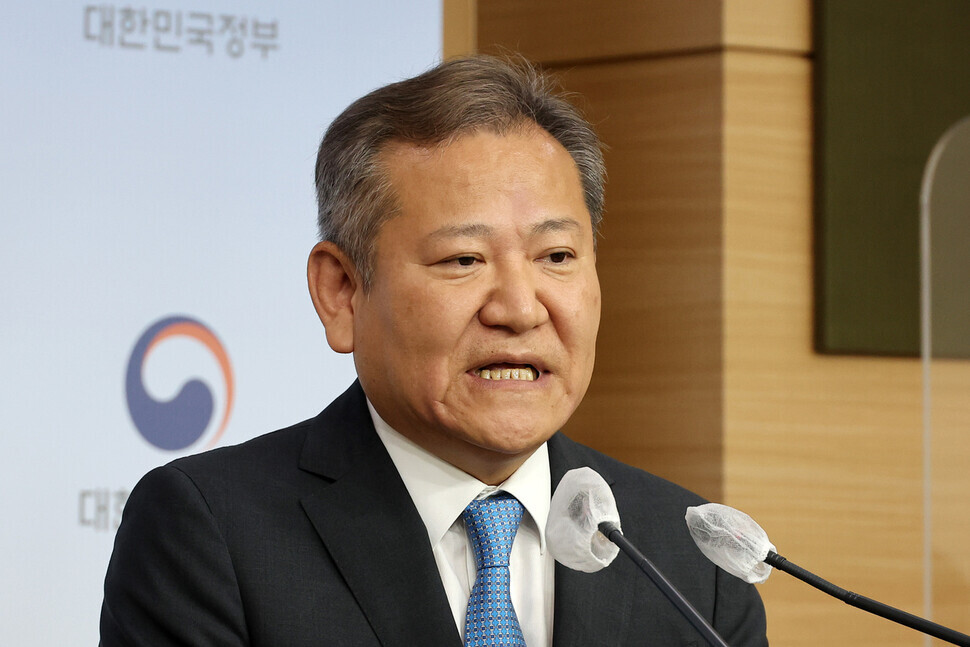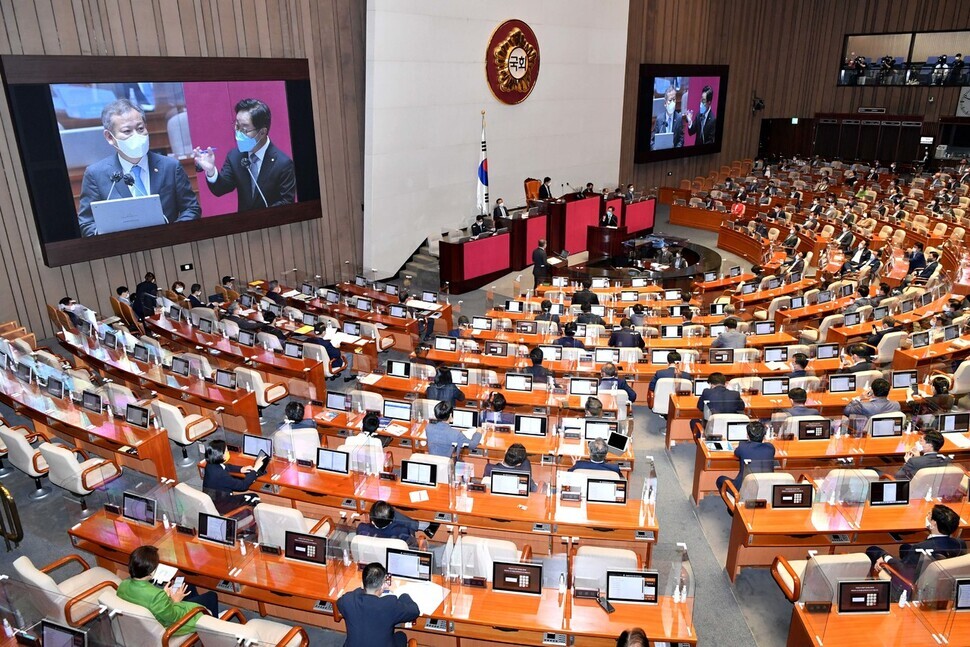hankyoreh
Links to other country sites 다른 나라 사이트 링크
Korean interior minister sparks outrage by likening police gathering to coup

Minister of the Interior and Safety Lee Sang-min sparked controversy with remarks comparing a nationwide meeting of police station chiefs opposing the creation of a new “police bureau” in his ministry to the military coup of Dec. 12, 1979, which led to Chun Doo-hwan taking power in South Korea.
Noting that police “are allowed to carry weapons,” Lee voiced an attitude that seemed to bizarrely suggest that armed police might attempt to overturn the government if the issue of their meeting is left unaddressed.
Rather than managing the outcry among the police — which has been growing into a movement where even senior police officials are calling on authorities to “discipline us too” — Lee has only been fanning the flames with remarks alluding to the unrealistic possibility of a police insurrection.
The response is raising questions about his competence and qualification to serve as a Cabinet minister — particularly when the emphasis at the time of his appointment was more on his background attending the same high school and university as President Yoon Suk-yeol, rather than any administrative experience to speak of.
In a briefing Monday at the Government Complex in Seoul, Lee criticized the nationwide police chiefs’ meeting as a “very dangerous action spearheaded by a particular group.”
“Police have the ability to use physical, coercive force, and they are even allowed to carry weapons,” he said, adding that it was “very dangerous to them to arbitrarily take it upon themselves to gather in one place to hold a meeting.”
Lee went on to say that the “December 1979 coup by the Hanahoe [an unofficial group of military officers] began just this way.”
“It is extremely dangerous when an organization that is capable of bearing arms defies orders from their superiors to arbitrarily meet and oppose government policies,” he argued, in one of numerous allusions to the possibility of police taking up arms. His argument seemed to suggest the possibility that the police’s ability to use physical force meant that their mere opposition to government policies could lead to insurrection.
Stressing that this was a “very serious situation that could result not just in disciplinary action, but in criminal punishment with prison sentences of up to one or two years,” Lee indicated that severe disciplinary action was an unavoidable consequence for those who attended the police chiefs’ meeting.
Lee did not back down on his “coup” remarks during an interpellation session at the National Assembly the same day.
“I was talking about the police officers involved in this situation, not all police officers in the Republic of Korea,” he insisted.
“If anything, these [meeting participants] are the ones hurting the reputation of other police officers who are quietly hard at work doing their duty,” he added.

When he did not state the specific identity of the “special group within the police” that he was referring to, he made comments hinting that it was a reference to graduates of the Korean National Police University. While Lee’s position at the head of the Ministry of the Interior and Safety means that he has to deal with a police organization made up of members who arrived through different pathways, his remarks appeared intended to encourage divisions and conflict within police ranks.
The presidential office kept up its message of pressure against the police for a second straight day, after remarks the day before by Kim Dae-ki, the president’s chief of staff.
In a Monday appearance on a CBS radio show, Kang Seung-gyu, senior secretary to the president for civil and social agenda, also stressed that “police chiefs, and police in general, also carry weapons.”
“It is a violation of service regulations for them to defy their superiors’ orders to disperse,” he said.
While he emphasized the importance of “actively communicating to sort out any misunderstandings that may exist within the police,” Kang also called for a stringent response, sharing a similar perspective to Lee Sang-min’s with his outlandish “coup” references.
On his way to the presidential office in Seoul’s Yongsan neighborhood that day, President Yoon Suk-yeol said he “expects the MOIS and National Policy Agency will take the necessary measures.” Some observers read his remarks as endorsing the solution of forcibly suppressing the police chiefs’ action with large-scale inspections and disciplinary measures — with the potential for a “coup” used as a pretext.
Within the police organization, the response to Lee’s coup remarks has been boiling over.
On Monday, police had around 30 mourning wreaths sent to the Police Memorial Park across from the NPA complex in Seoul’s Seodaemun District, attaching messages such as “The ‘people’s police’ is dead.”
The police’s internal bulletin board was bombarded with critical messages.
“A Cabinet minister is drawing comparisons between a gathering of police chiefs to discuss organizational directions and a military coup? He should be ashamed of himself,” one read.
Efforts are also underway to encourage participation in a nationwide meeting of team leaders at the lieutenant and inspector levels, which has been announced for Saturday.
South Korea has over 2,000 local patrol divisions and police substations, most of which are overseen by inspectors.
By Park Su-ji, staff reporter; Jeon Jong-hwi, staff reporter; Joh Yun-yeong, staff reporter; Kwak Jin-san, staff reporter
Please direct questions or comments to [english@hani.co.kr]

Editorial・opinion
![[Column] Has Korea, too, crossed the Rubicon on China? [Column] Has Korea, too, crossed the Rubicon on China?](https://flexible.img.hani.co.kr/flexible/normal/500/300/imgdb/original/2024/0419/9317135153409185.jpg) [Column] Has Korea, too, crossed the Rubicon on China?
[Column] Has Korea, too, crossed the Rubicon on China?![[Correspondent’s column] In Japan’s alliance with US, echoes of its past alliances with UK [Correspondent’s column] In Japan’s alliance with US, echoes of its past alliances with UK](https://flexible.img.hani.co.kr/flexible/normal/500/300/imgdb/original/2024/0419/2317135166563519.jpg) [Correspondent’s column] In Japan’s alliance with US, echoes of its past alliances with UK
[Correspondent’s column] In Japan’s alliance with US, echoes of its past alliances with UK- [Editorial] Does Yoon think the Korean public is wrong?
- [Editorial] As it bolsters its alliance with US, Japan must be accountable for past
- [Guest essay] Amending the Constitution is Yoon’s key to leaving office in public’s good graces
- [Editorial] 10 years on, lessons of Sewol tragedy must never be forgotten
- [Column] A death blow to Korea’s prosecutor politics
- [Correspondent’s column] The US and the end of Japanese pacifism
- [Guest essay] How Korea turned its trainee doctors into monsters
- [Guest essay] As someone who helped forge Seoul-Moscow ties, their status today troubles me
Most viewed articles
- 1[Column] The clock is ticking for Korea’s first lady
- 2Hong Se-hwa, voice for tolerance whose memoir of exile touched a chord, dies at 76
- 3After 2 months of delayed, denied medical care, Koreans worry worst may be yet to come
- 4[Column] Has Korea, too, crossed the Rubicon on China?
- 5US overtakes China as Korea’s top export market, prompting trade sanction jitters
- 6Samsung barricades office as unionized workers strike for better conditions
- 7[Correspondent’s column] In Japan’s alliance with US, echoes of its past alliances with UK
- 8All eyes on Xiaomi after it pulls off EV that Apple couldn’t
- 9[Correspondent’s column] The US and the end of Japanese pacifism
- 10[Guest essay] How Korea turned its trainee doctors into monsters